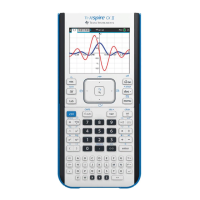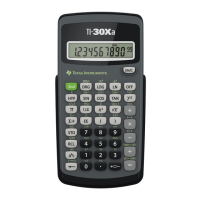TI-Nspire™ Reference Guide 69
normCdf()
Catalog
>
normCdf(lowBound,upBound[,m[,s]]) ⇒ number if lowBound
and
upBound are numbers, list if lowBound and upBound are
lists
Computes the normal distribution probability between lowBound
and upBound for the specified m (default=0) and s (default=1).
For P(X { upBound), set lowBound = .9E999.
normPdf()
Catalog
>
normPdf(XVal[,m[,s]]) ⇒ number if XVal is a number, list if
XVal is a list
Computes the probability density function for the normal distribution
at a specified XVal value for the specified m and s.
not
Catalog
>
not BooleanExpr ⇒ Boolean expression
Returns true, false, or a simplified form of the argument.
not Integer1 ⇒ integer
Returns the one’s complement of a real integer. Internally, Integer1 is
converted to a signed, 64-bit binary number. The value of each bit is
flipped (0 becomes 1, and vice versa) for the one’s complement.
Results are displayed according to the Base mode.
You can enter the integer in any number base. For a binary or
hexadecimal entry, you must use the 0b or 0h prefix, respectively.
Without a prefix, the integer is treated as decimal (base 10).
If you enter a decimal integer that is too large for a signed, 64-bit
binary form, a symmetric modulo operation is used to bring the value
into the appropriate range. For more information, see 4Base2,
page 12.
In Hex base mode:
In Bin base mode:
To see the entire result, press £ and then use ¡ and ¢ to
move the cursor.
Note: A binary entry can have up to 64 digits (not counting the
0b prefix). A hexadecimal entry can have up to 16 digits.
nPr()
Catalog
>
nPr(Va l ue 1 , Val u e2 ) ⇒ expression
For integer Va lu e 1 and Va l ue 2 with Va l ue 1 | Val ue 2 | 0, nPr() is
the number of permutations of Va lu e 1 things taken Va l ue 2 at a time.
nPr(Va lu e , 0) ⇒ 1
nPr(
Va lu e, negInteger) ⇒ 1/((Va lu e +1)·(Val ue +2)...
(
Va lu eNnegInteger))
nPr(
Va lu e, posInteger) ⇒ Va l ue ·(Va lu eN1)...
(
Va lu eNposInteger+1)
nPr(
Va lu e, nonInteger) ⇒ Va lu e! / (Va l ue NnonInteger)!
nPr(
List1, List2) ⇒ list
Returns a list of permutations based on the corresponding element
pairs in the two lists. The arguments must be the same size list.
Important: Zero, not the letter O.

